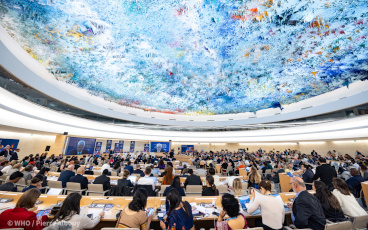Polio in north-eastern Afghanistan
1.5 million children vaccinated
September 2010 / Kabul, Afghanistan – In a region that has been polio-free for nearly a decade, a new polio case has been detected in the Imam Sahib district of the north-eastern Afghan province of Kunduz bordering Tajikistan. The case was quickly identified, thanks to the well-functioning Acute Flaccid Paralysis (AFP) surveillance system.
The initial assumption was that source of the virus might have been neighbouring Tajikistan, which is currently experiencing a large polio outbreak, but it now seems that it might have the result of cross-border population movement from neighbouring Pakistan.
The Ministry of Public Health has launched a rapid response plan to prevent further circulation and spread of the virus. From 5-7 September, 1.5 million children under five years of age are being vaccinated in 5 adjacent provinces, namely Badakahshan, Takhar, Kunduz, Baghlan and Balkh.
To guarantee that no child is left unvaccinated, a four-pronged approach will be taken: carrying out house-to-house visits; setting up mobile clinics; establishing fixed teams in hospitals and setting up immunization posts at border crossing points.
“In addition to next week’s campaign, surveillance will be further enhanced in the area,” said Peter Graaff, WHO Representative to Afghanistan. “We will also need to have ever-stronger cross-border coordination mechanisms, which include synchronising vaccination activities, data sharing and joint supervision, building on what already exists between Afghanistan and Pakistan.”
Already in early June, 1.2 million children aged under 5 years were vaccinated against polio in the north-eastern region at the onset of the outbreak in Tajikistan.
“Afghanistan’s northern regions have been polio-free for some 10 years, making it all the more important to contain possible spill-over effects from outbreaks in neighbouring areas,” said Peter Crowley, UNICEF Representative to Afghanistan.
Polio is a highly infectious and sometimes fatal disease and is often marked by acute flaccid paralysis among sufferers. It has been eradicated from much of the world, but remains endemic in Afghanistan, Pakistan, India and Nigeria, where major eradication efforts are still ongoing. The Global Polio Eradication Initiative is spearheaded by national governments, WHO, Rotary International, US CDC and UNICEF.
Every year, the Ministry of Public Health of Afghanistan and its partners conduct at least 4 nationwide campaigns and 4 sub-national campaigns in Afghanistan’s populated southern, south-eastern and eastern regions. During each nationwide campaign, approximately 8 million children aged under 5 years are targeted across the country.













